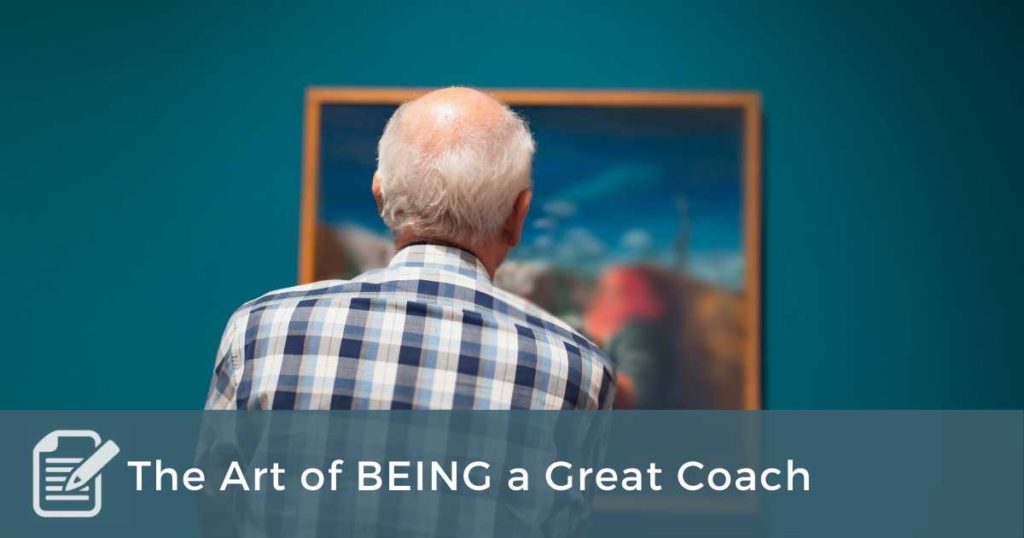There is a difference between being a coach and doing coaching, just as there is a difference between being a pastor and doing the job of pastoring. I just finished up teaching an online class called Building a Dynamic Coaching Relationship with excellent, deep thinking students. During our last class, we discussed “What do you need to BE a great coach?” Much of coach training centers around how to DO coaching. This is a great conversation.
Here are four foundational characteristics of BEING a great coach.
A Great Coach Is Curious
A great coach is curious about people, how they think, how they react, how they manage their feelings, and how they take action.
I got this trait from my mother. My favorite story about my mom happened when I was around 9 or 10 years old. We stopped at the grocery store. I stayed in the car because she said she would be real quick. I kept watch for her because I didn’t expect her to be long. People would walk in the store. People would walk out. People would walk in. People would walk out. Lots of people.
After 45 minutes, she came out. She had a small bag of groceries. I was a little irritated. What had taken so long? She said there was a line at the register. I burst out, “There was no line at the register. People went in. People came out. I had been paying attention!”
“OK, she admitted. I was talking to someone.” Who? I wondered. Who did she talk to for almost an hour? “I don’t know his name,” she admitted. “But he was really interesting!”
People are rarely held back by lack of a solution. People usually know what they need to do. They just can’t imagine themselves doing it. Something is holding them back. A curious coach wants to know what it is. A curious coach wonders if the client has been in this situation before. A curious coach wonders what the client’s hero would have done in this exact same situation. Heroes don’t hold back.
People are rarely propelled forward by draconian accountability. I would run faster for about 15 seconds when my high school basketball coach would yell at me. Accountability is best when the reward outshines the action. Don’t assume everybody wants rewarded the same. Studies have shown that money doesn’t create the most effort. A curious coach wonders what has driven the client in the past and what will propel them into the future.
A Great Coach Is a Willing Partner
“If you aren’t going to take my advice, why did you ask for it,” said no great coach ever.
My favorite Dave Ramsey story is that when someone walks into his office with a problem, it is like a monkey jumps down from their shoulder and lands on his desk. Dave’s primary goal for the conversation is that when the person leaves, the monkey leaves with them. Too many leaders have adopted too many pet monkeys.
In a coaching partnership, the client is responsible for solving the problem. The clients comes up with the solution and is responsible for taking the action. The consequences for failure and success are upon the client. The coach is responsible to ensure the client has considered all the options and created an achievable plan. The coach is responsible to make sure the client has uncovered all obstacles and created some accountability that will drive the client through the hardest part.
The coach and the client are in it together, but each holds different responsibilities.
To be a willing partner, you need to be present. You need to give your attention and energy to the person sitting with you. Everything else needs to go dim for you. You need to become a master of the art of great listening and the asker of powerful, thought-provoking questions.
Coach the person, not the problem. Partner with the client to help them get forward movement.
A Great Coach Needs To Be Non-Judgmental
“This is dumb,” I said to my son yesterday when he walked home in the cold and dark instead of noticing that I was sitting right outside of the school waiting on him. My wife grimaced at me. Labeling something as dumb won’t create any solutions. It doesn’t create any discovery. It might even convince the client that there isn’t any discovery. You are telling them, “This is something that will never change.”
I’ve thought about writing a story about a man who is twice as smart as the next smartest person on the planet. The main problem is it is a really boring book. The man is constantly having to solve the most difficult problems and begins to lack the desire to be constantly on call. (Of course, the other problem with the book is that the smartest person on the planet is probably not a man.)
It is boring being the smartest person in the room. You are also probably an obstacle rather than a resource. (There may be a few exceptions to this rule, such as Steve Jobs, but you are as likely to be the exception as you are to win the billion dollar Powerball lottery that is in the news right now.)
A great coach doesn’t want to shut down anyone’s thinking. A great coach wants to fire it up. So the first idea wasn’t a polished winner. It never is. How do you build on it? What does it make you think of next? What are the fifty best ideas to solve this problem? What are three solutions that can only work if a miracle occurs? The best ideas is are at the borders of our thoughts. Being judgmental shuts down the process.
A Great Coach Is a Learner
At church Sunday, I talked to the bass player from the worship team. He is fantastic. He toured with a rock and roll star in his early years. I told him I love watching him play. He smiled and without a touch of hubris said, “I’m still learning.” That is the heart of a great coach.
There is always more to learn. There is always something that has changed. There is always a better way.
We live in an age where being a learner is easy. There are classes everywhere. Websites like Udemy, Udacity, Lynda, and Khan Academy are at our finger tips. MIT puts all their class material online for free.
What else does it take to BE a great coach?



